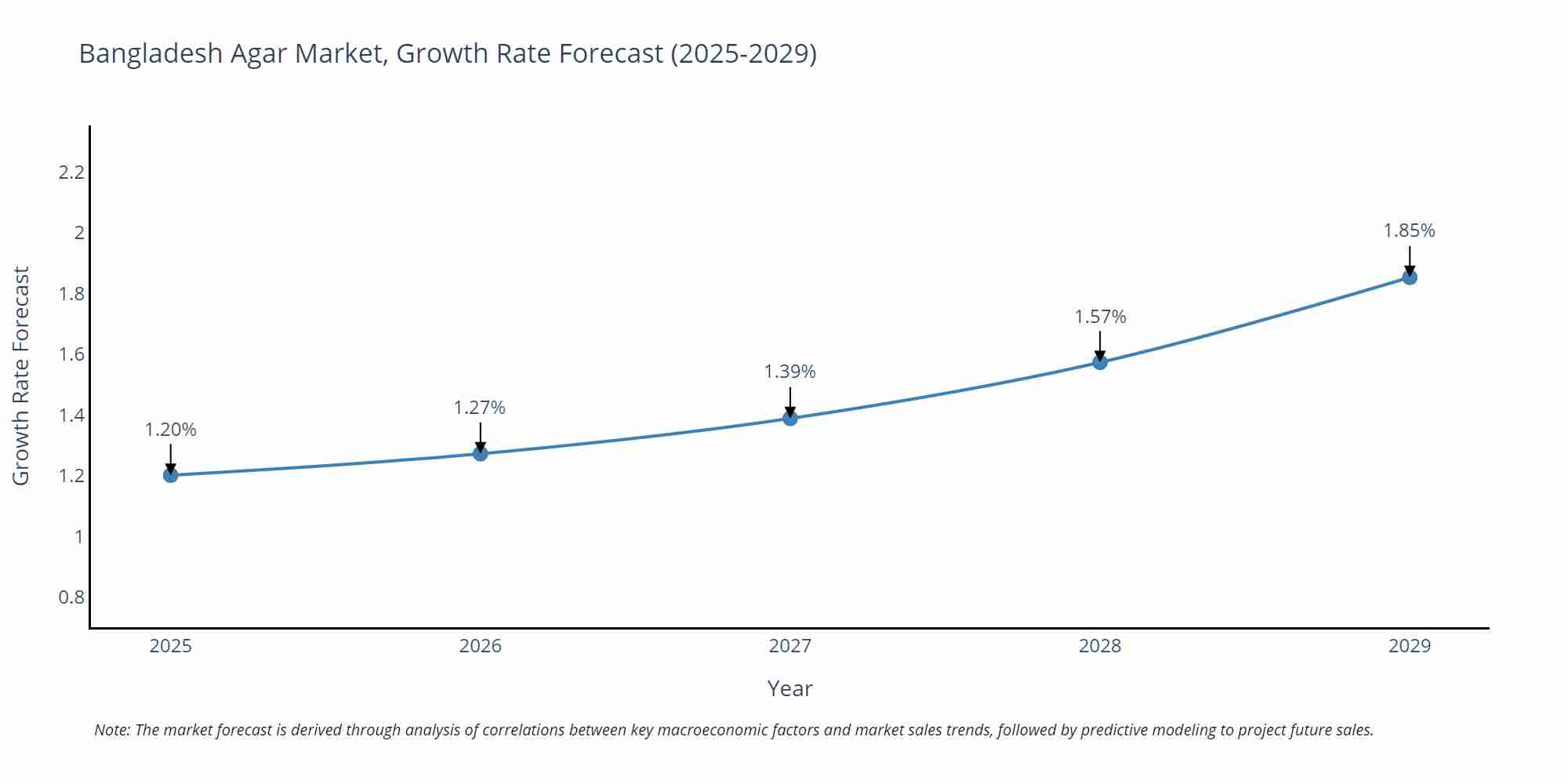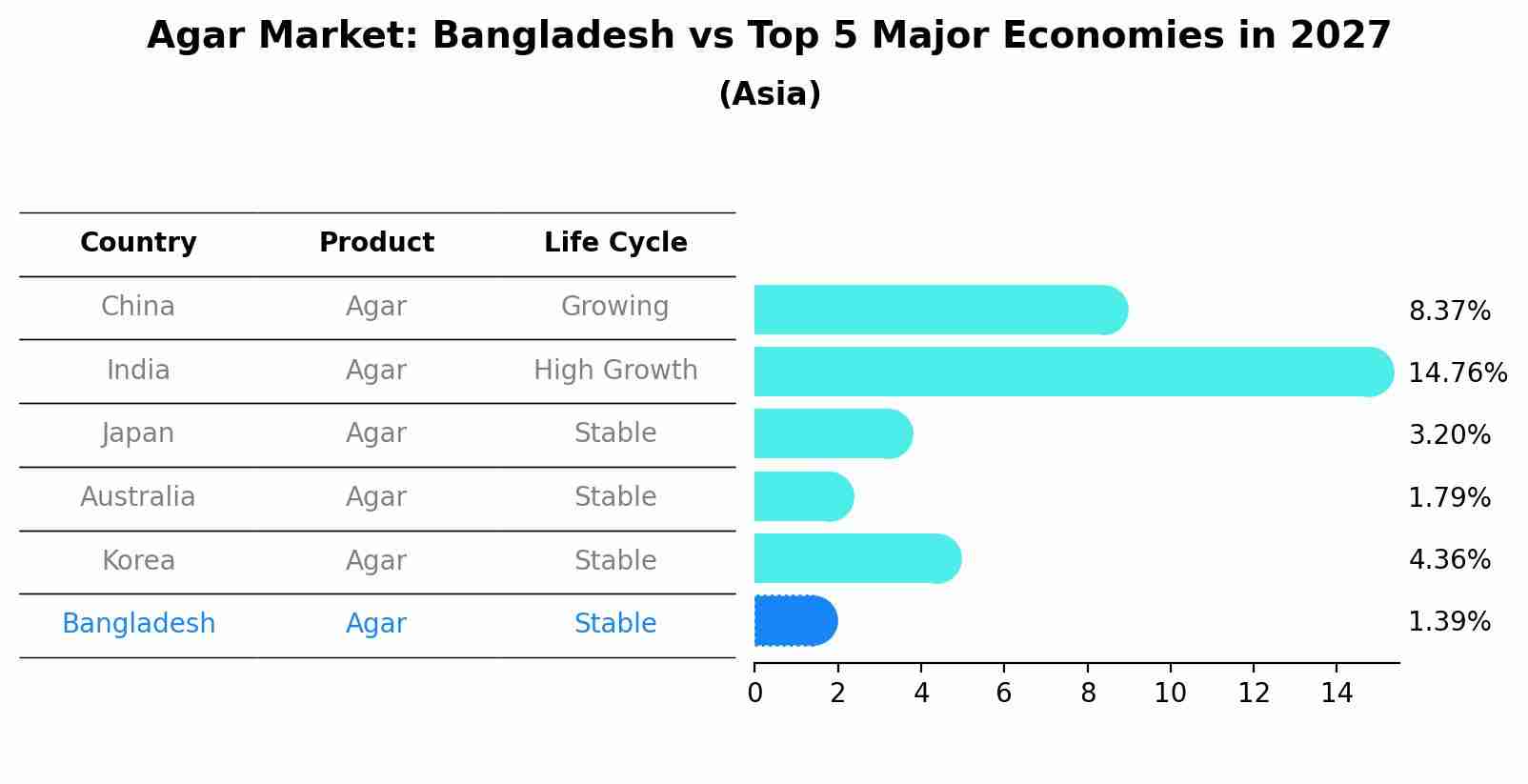Bangladesh Agar Market (2025-2031) Outlook | Revenue, Value, Industry, Trends, Forecast, Companies, Growth, Share, Size & Analysis
| Product Code: ETC388412 | Publication Date: Aug 2022 | Updated Date: Jul 2025 | Product Type: Market Research Report | |
| Publisher: 6Wresearch | Author: Sumit Sagar | No. of Pages: 75 | No. of Figures: 35 | No. of Tables: 20 |
Bangladesh Agar Market Size Growth Rate
The Bangladesh Agar Market is likely to experience consistent growth rate gains over the period 2025 to 2029. Commencing at 1.20% in 2025, growth builds up to 1.85% by 2029.

Agar Market: Bangladesh vs Top 5 Major Economies in 2027 (Asia)
By 2027, the Agar market in Bangladesh is anticipated to reach a growth rate of 1.39%, as part of an increasingly competitive Asia region, where China remains at the forefront, supported by India, Japan, Australia and South Korea, driving innovations and market adoption across sectors.

Bangladesh Agar Market Synopsis
The Bangladesh Agar market is experiencing steady growth due to increasing demand from various industries such as food and beverage, pharmaceuticals, cosmetics, and textiles. Agar, a gel-like substance derived from seaweed, is widely used as a stabilizer, thickener, and gelling agent in a variety of products. The market is driven by the rising popularity of agar-based desserts and the growing awareness of its health benefits. Additionally, the expanding textile industry in Bangladesh is fueling the demand for agar as a sizing agent in the manufacturing process. Key players in the Bangladesh agar market include manufacturers such as Indo Agar, Agar Agar Food Industries, and Marine Chemicals. With ongoing product innovation and increasing applications across industries, the Bangladesh agar market is poised for further growth in the coming years.
Bangladesh Agar Market Trends
The Bangladesh Agar market is experiencing growth due to increasing demand for agar-agar in various industries such as food and beverage, pharmaceuticals, and cosmetics. The rising popularity of vegetarian and plant-based products has also contributed to the market expansion as agar-agar, derived from seaweed, serves as a natural alternative to gelatin. Consumers are increasingly drawn to agar-agar for its gelling properties, nutritional benefits, and eco-friendly profile. In addition, the market is witnessing innovation in agar-based products, with manufacturers introducing new flavors, formats, and applications to cater to evolving consumer preferences. As a result, the Bangladesh Agar market is expected to continue its positive trajectory in the coming years, driven by growing awareness of agar-agar`s versatility and sustainability.
Bangladesh Agar Market Challenges
In the Bangladesh Agar market, key challenges include fluctuating agarwood prices due to supply-demand imbalances, limited availability of high-quality agarwood trees, illegal logging leading to depletion of natural resources, and lack of standardized grading systems which can result in inconsistency in product quality. Additionally, the industry faces issues related to unsustainable harvesting practices, lack of awareness about sustainable agarwood cultivation techniques, and competition from synthetic agarwood products. These challenges collectively impact the overall sustainability and growth of the Bangladesh Agar market, necessitating the need for regulatory measures, investment in research and development, and increased awareness about sustainable practices among stakeholders to overcome these hurdles and ensure the long-term viability of the industry.
Bangladesh Agar Market Investment Opportunities
The Bangladesh Agar Market presents promising investment opportunities due to the growing demand for agar products in various industries such as food, pharmaceuticals, and cosmetics. With agar being widely used as a gelling agent, thickener, and stabilizer, there is a consistent demand for this natural ingredient. Investors can consider opportunities in agar production facilities, agar extraction technology, or agar product development to capitalize on the market growth. Additionally, the increasing awareness of agar as a sustainable and plant-based alternative to synthetic additives further enhances its market potential. Collaborating with local agar suppliers, conducting market research on consumer preferences, and investing in innovative agar applications could lead to successful ventures in the Bangladesh Agar Market.
Jordan Agar Market Government Policies
The Bangladesh government has implemented various policies to regulate the Agar market, including the Agar Cultivation Act, 1986, which aims to control the production, processing, and marketing of Agar products. The government also provides subsidies and support to Agar farmers to encourage cultivation and improve productivity. Additionally, the Department of Agriculture Extension (DAE) promotes best practices in Agar cultivation through training programs and extension services. Importantly, the government has introduced quality control measures to ensure that Agar products meet international standards for export. Overall, these policies are aimed at promoting sustainable growth in the Agar market, boosting exports, and supporting the livelihoods of Agar farmers in Bangladesh.
Bangladesh Agar Market Future Outlook
The Bangladesh Agar Market is poised for significant growth in the coming years due to increasing demand for agar in various industries such as food and beverage, pharmaceuticals, and cosmetics. Agar is a versatile ingredient known for its gelling properties, making it a popular choice for food products and as a vegan alternative to gelatin. With rising disposable incomes and changing consumer preferences towards natural and plant-based products, the demand for agar is expected to rise steadily. Additionally, the expanding pharmaceutical and cosmetic industries in Bangladesh are likely to drive further growth in the agar market. Companies operating in this market have opportunities to innovate and develop new agar-based products to cater to the evolving needs of consumers, ultimately leading to a positive outlook for the Bangladesh Agar Market.
Key Highlights of the Report:
- Bangladesh Agar Market Outlook
- Market Size of Bangladesh Agar Market, 2024
- Forecast of Bangladesh Agar Market, 2031
- Historical Data and Forecast of Bangladesh Agar Revenues & Volume for the Period 2021 - 2031
- Bangladesh Agar Market Trend Evolution
- Bangladesh Agar Market Drivers and Challenges
- Bangladesh Agar Price Trends
- Bangladesh Agar Porter's Five Forces
- Bangladesh Agar Industry Life Cycle
- Historical Data and Forecast of Bangladesh Agar Market Revenues & Volume By Form for the Period 2021 - 2031
- Historical Data and Forecast of Bangladesh Agar Market Revenues & Volume By Strip for the Period 2021 - 2031
- Historical Data and Forecast of Bangladesh Agar Market Revenues & Volume By Powder for the Period 2021 - 2031
- Historical Data and Forecast of Bangladesh Agar Market Revenues & Volume By Others for the Period 2021 - 2031
- Historical Data and Forecast of Bangladesh Agar Market Revenues & Volume By Application for the Period 2021 - 2031
- Historical Data and Forecast of Bangladesh Agar Market Revenues & Volume By Food and Beverage for the Period 2021 - 2031
- Historical Data and Forecast of Bangladesh Agar Market Revenues & Volume By Pharmaceuticals for the Period 2021 - 2031
- Historical Data and Forecast of Bangladesh Agar Market Revenues & Volume By Other Applications for the Period 2021 - 2031
- Bangladesh Agar Import Export Trade Statistics
- Market Opportunity Assessment By Form
- Market Opportunity Assessment By Application
- Bangladesh Agar Top Companies Market Share
- Bangladesh Agar Competitive Benchmarking By Technical and Operational Parameters
- Bangladesh Agar Company Profiles
- Bangladesh Agar Key Strategic Recommendations
Frequently Asked Questions About the Market Study (FAQs):
- Single User License$ 1,995
- Department License$ 2,400
- Site License$ 3,120
- Global License$ 3,795
Search
Thought Leadership and Analyst Meet
Our Clients
Related Reports
- Germany Breakfast Food Market (2026-2032) | Industry, Share, Growth, Size, Companies, Value, Analysis, Revenue, Trends, Forecast & Outlook
- Australia Briquette Market (2025-2031) | Growth, Size, Revenue, Forecast, Analysis, Trends, Value, Share, Industry & Companies
- Vietnam System Integrator Market (2025-2031) | Size, Companies, Analysis, Industry, Value, Forecast, Growth, Trends, Revenue & Share
- ASEAN and Thailand Brain Health Supplements Market (2025-2031) | Strategy, Consumer Insights, Analysis, Investment Trends, Opportunities, Growth, Size, Share, Industry, Revenue, Segments, Value, Segmentation, Supply, Forecast, Restraints, Outlook, Competition, Drivers, Trends, Demand, Pricing Analysis, Competitive, Strategic Insights, Companies, Challenges
- ASEAN Bearings Market (2025-2031) | Strategy, Consumer Insights, Analysis, Investment Trends, Opportunities, Growth, Size, Share, Industry, Revenue, Segments, Value, Segmentation, Supply, Forecast, Restraints, Outlook, Competition, Drivers, Trends, Demand, Pricing Analysis, Competitive, Strategic Insights, Companies, Challenges
- Europe Flooring Market (2025-2031) | Outlook, Share, Industry, Trends, Forecast, Companies, Revenue, Size, Analysis, Growth & Value
- Saudi Arabia Manlift Market (2025-2031) | Outlook, Size, Growth, Trends, Companies, Industry, Revenue, Value, Share, Forecast & Analysis
- Uganda Excavator, Crane, and Wheel Loaders Market (2025-2031) | Strategy, Consumer Insights, Analysis, Investment Trends, Opportunities, Growth, Size, Share, Industry, Revenue, Segments, Value, Segmentation, Supply, Forecast, Restraints, Outlook, Competition, Drivers, Trends, Demand, Pricing Analysis, Competitive, Strategic Insights, Companies, Challenges
- Rwanda Excavator, Crane, and Wheel Loaders Market (2025-2031) | Strategy, Consumer Insights, Analysis, Investment Trends, Opportunities, Growth, Size, Share, Industry, Revenue, Segments, Value, Segmentation, Supply, Forecast, Restraints, Outlook, Competition, Drivers, Trends, Demand, Pricing Analysis, Competitive, Strategic Insights, Companies, Challenges
- Kenya Excavator, Crane, and Wheel Loaders Market (2025-2031) | Strategy, Consumer Insights, Analysis, Investment Trends, Opportunities, Growth, Size, Share, Industry, Revenue, Segments, Value, Segmentation, Supply, Forecast, Restraints, Outlook, Competition, Drivers, Trends, Demand, Pricing Analysis, Competitive, Strategic Insights, Companies, Challenges
Industry Events and Analyst Meet
Whitepaper
- Middle East & Africa Commercial Security Market Click here to view more.
- Middle East & Africa Fire Safety Systems & Equipment Market Click here to view more.
- GCC Drone Market Click here to view more.
- Middle East Lighting Fixture Market Click here to view more.
- GCC Physical & Perimeter Security Market Click here to view more.
6WResearch In News
- Doha a strategic location for EV manufacturing hub: IPA Qatar
- Demand for luxury TVs surging in the GCC, says Samsung
- Empowering Growth: The Thriving Journey of Bangladesh’s Cable Industry
- Demand for luxury TVs surging in the GCC, says Samsung
- Video call with a traditional healer? Once unthinkable, it’s now common in South Africa
- Intelligent Buildings To Smooth GCC’s Path To Net Zero


















